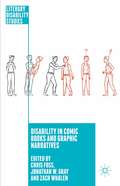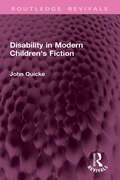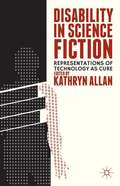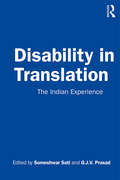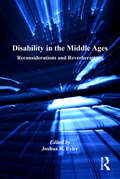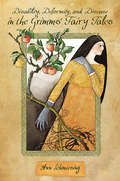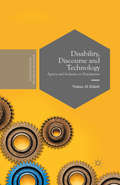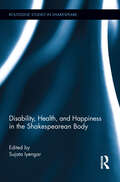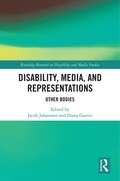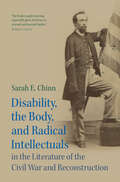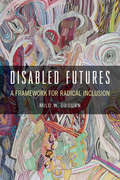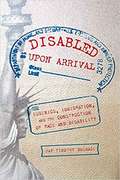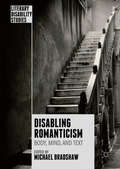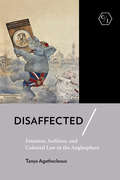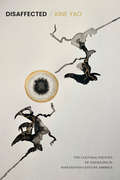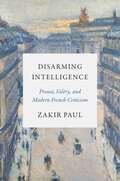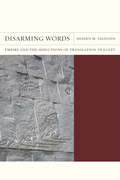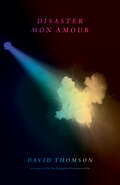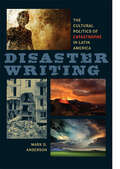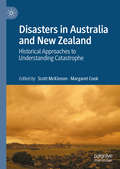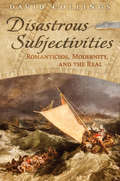- Table View
- List View
Disability in Comic Books and Graphic Narratives (Literary Disability Studies)
by Zach WhalenAs there has yet to be any substantial scrutiny of the complex confluences a more sustained dialogue between disability studies and comics studies might suggest, Disability in Comic Books and Graphic Narratives aims through its broad range of approaches and focus points to explore this exciting subject in productive and provocative ways.
Disability in Modern Children's Fiction (Routledge Revivals)
by John QuickeFirst published in 1985, Disability in Modern Children’s Fiction presents a case for the inclusion of a planned element in the mainstream curriculum, specifically designed to encourage positive attitudes and actions towards children with special needs, and for utilising the possibilities inherent in fiction for helping all children to explore their thoughts and feelings in this area. The central chapters of the book are concerned with a critical examination of specific texts, focusing on how they deal with disability in a story context. Books are grouped for discussion under common themes which have been teased out according to their contemporary relevance: the effects on the family of a severely disabled child; the struggle of a child with a disability for personal identity in oppressive social circumstances; the interaction between disability, race, gender and social class; the different reactions of ‘normal’ children towards disabled peers; the failings of the medical approach to disability; love, sex, adolescence and disability; the relationship between children and handicapped adults. The penultimate chapter is concerned with an evaluation of picture books and quasi-fiction for younger children. This book will be of interest to students of disability studies, pedagogy and literature.
Disability in Science Fiction
by Kathryn AllanIn this groundbreaking collection, twelve international scholars - with backgrounds in disability studies, English and world literature, classics, and history - discuss the representation of dis/ability, medical "cures," technology, and the body in science fiction.
Disability in Translation: The Indian Experience
by Someshwar Sati G.J.V. PrasadThis volume explores how disability is seen, written about, read and understood through literature and translation. Foregrounding the asymmetrical world of power relations, it delves into the act of translation to exhibit how disability is constructed and deployed in language and culture. The essays in the volume reflect and theorise on experiences of translating various Indian-language stories (into English) which have disability as their subject. They focus on recovering and empowering marginal voices, as well as on the mechanics of translating idioms of disability. Furthermore, the book goes on to engage the reader to demonstrate how disability, and the space it occupies in our lives, can be reinforced or deconstructed in translation. A major intervention in translation and disability studies, this volume will be of great interest to scholars and researchers of literature, culture, and sociology.
Disability in the Middle Ages: Reconsiderations and Reverberations
by Joshua R. EylerWhat do we mean when we talk about disability in the Middle Ages? This volume brings together dynamic scholars working on the subject in medieval literature and history, who use the latest approaches from the field to address this central question. Contributors discuss such standard medieval texts as the Arthurian Legend, The Canterbury Tales and Old Norse Sagas, providing an accessible entry point to the field of medieval disability studies to medievalists. The essays explore a wide variety of disabilities, including the more traditionally accepted classifications of blindness and deafness, as well as perceived disabilities such as madness, pregnancy and age. Adopting a ground-breaking new approach to the study of disability in the medieval period, this provocative book will interest medievalists and scholars of disability throughout history.
Disability, Deformity, and Disease in the Grimms' Fairy Tales
by Ann SchmiesingAlthough dozens of disabled characters appear in the Grimms' Children's and Household Tales, the issue of disability in their collection has remained largely unexplored by scholars. In Disability, Deformity, and Disease in the Grimms' Fairy Tales, author Ann Schmiesing analyzes various representations of disability in the tales and also shows how the Grimms' editing (or "prostheticizing") of their tales over seven editions significantly influenced portrayals of disability and related manifestations of physical difference, both in many individual tales and in the collection overall. Schmiesing begins by exploring instabilities in the Grimms' conception of the fairy tale as a healthy and robust genre that has nevertheless been damaged and needs to be restored to its organic state. In chapter 2, she extends this argument by examining tales such as "The Three Army Surgeons" and "Brother Lustig" that problematize, against the backdrop of war, characters' efforts to restore wholeness to the impaired or diseased body. She goes on in chapter 3 to study the gendering of disability in the Grimms' tales with particular emphasis on the Grimms' editing of "The Maiden Without Hands" and "The Frog King or Iron Henry." In chapter 4, Schmiesing considers contradictions in portrayals of characters such as Hans My Hedgehog and the Donkey as both cripple and "supercripple"--a figure who miraculously "overcomes" his disability and triumphs despite social stigma. Schmiesing examines in chapter 5 tales in which no magical erasure of disability occurs, but in which protagonists are depicted figuratively "overcoming" disability by means of other personal abilities or traits. The Grimms described the fairy tale using metaphors of able-bodiedness and wholeness and espoused a Romantic view of their editorial process as organic restoration. Disability, Deformity, and Disease in the Grimms' Fairy Tales shows, however, the extent to which the Grimms' personal experience of disability and illness impacted the tales and reveals the many disability-related amendments that exist within them. Readers interested in fairy-tales studies and disability studies will appreciate this careful reading of the Grimms' tales.
Disability, Discourse and Technology: Agency and Inclusion in (Inter)action (Postdisciplinary Studies in Discourse)
by Najma Al ZidjalyExclusion is the main predicament faced by people with disabilities across contexts and cultures, yet it is one of the least academically studied concepts. This book offers an applied linguistics perspective on critical and timely issues in disability research, filling in a number of gaps in discourse analysis and disability studies.
Disability, Health, and Happiness in the Shakespearean Body (Routledge Studies in Shakespeare)
by Sujata IyengarThis book considers early modern and postmodern ideals of health, vigor, ability, beauty, well-being, and happiness, uncovering and historicizing the complex negotiations among physical embodiment, emotional response, and communally-sanctioned behavior in Shakespeare's literary and material world. The volume visits a series of questions about the history of the body and how early modern cultures understand physical ability or vigor, emotional competence or satisfaction, and joy or self-fulfillment. Individual essays investigate the purported disabilities of the "crook-back" King Richard III or the "corpulent" Falstaff, the conflicts between different health-care belief-systems in The Taming of the Shrew and Hamlet, the power of figurative language to delineate or even instigate puberty in the Sonnets or Romeo and Juliet, and the ways in which the powerful or moneyed mediate the access of the poor and injured to cure or even to care. Integrating insights from Disability Studies, Health Studies, and Happiness Studies, this book develops both a detailed literary-historical analysis and a provocative cultural argument about the emphasis we place on popular notions of fitness and contentment today.
Disability, Media, and Representations: Other Bodies (Routledge Research in Disability and Media Studies)
by Jacob Johanssen Diana GarrisiBringing together scholars from around the world to research the intersection between media and disability, this edited collection aims to offer an interdisciplinary exploration and critique of print, broadcast and online representations of physical and mental impairments.Drawing on a wide range of case studies addressing how people can be ‘othered’ in contemporary media, the chapters focus on analyses of hateful discourses about disability on Reddit, news coverage of disability and education, media access of individuals with disabilities, the logic of memes and brain tumour on Twitter, celebrity and Down Syndrome on Instagram, disability in TV drama, the metaphor of disability for the nation; as well as an autoethnography of treatment of breast cancer. Providing a much-needed global perspective, Disability, Media, and Representations examines the relationship between self-representation and representations in either reinforcing or debunking myths around disability, and ways in which academic discourse can be differently articulated to study the relationship between media and disability. This book will be of interest to students and researchers of disability studies and media studies as well as activists and readers engaged in debates on diversity, inclusivity and the media.
Disability, the Body, and Radical Intellectuals in the Literature of the Civil War and Reconstruction (Cambridge Studies in American Literature and Culture)
by Sarah E. ChinnDuring the Civil War, hundreds of thousands of men were injured, and underwent amputation of hands, feet, limbs, fingers, and toes. As the war drew to a close, their disabled bodies came to represent the future of a nation that had been torn apart, and how it would be put back together again. In her authoritative and engagingly written new book, Sarah Chinn claims that amputation spoke both corporeally and metaphorically to radical white writers, ministers, and politicians about the need to attend to the losses of the Civil War by undertaking a real and actual Reconstruction that would make African Americans not just legal citizens but actual citizens of the United States. She traces this history, reviving little-known figures in the struggle for Black equality, and in so doing connecting the racial politics of 150 years ago with contemporary debates about justice and equity.
Disabled Futures: A Framework for Radical Inclusion (D/C: Dis/color #3)
by Milo W. ObournDisabled Futures makes an important intervention in disability studies by taking an intersectional approach to race, gender, and disability. Milo Obourn reads disability studies, gender and sexuality studies, and critical race studies to develop a framework for addressing inequity. They theorize the concept of “racialized disgender”—to describe the ways in which racialization and gendering are social processes with disabling effects—thereby offering a new avenue for understanding race, gender, and disability as mutually constitutive. Obourn uses readings of literature and popular culture from Lost and Avatar to Octavia Butler’s Xenogenesis trilogy to explore and unpack specific ways that race and gender construct—and are constructed by—historical notions of ability and disability, sickness and health, and successful recovery versus damaged lives. What emerges is not only a more complex and deeper understanding of the intersections between ableism, racism, and (cis)sexism, but also possibilities for imagining alternate and more radically inclusive futures in which all of our identities, experiences, freedoms, and oppressions are understood as interdependent and intertwined.
Disabled Upon Arrival: Eugenics, Immigration, And The Construction Of Race And Disability
by Jay Timothy DolmageIn North America, immigration has never been about immigration. That was true in the early twentieth century when anti-immigrant rhetoric led to draconian crackdowns on the movement of bodies, and it is true today as new measures seek to construct migrants as dangerous and undesirable. This premise forms the crux of Jay Timothy Dolmage’s new book Disabled Upon Arrival: Eugenics, Immigration, and the Construction of Race and Disability, a compelling examination of the spaces, technologies, and discourses of immigration restriction during the peak period of North American immigration in the early twentieth century. Through careful archival research and consideration of the larger ideologies of racialization and xenophobia, Disabled Upon Arrival links anti-immigration rhetoric to eugenics—the flawed “science” of controlling human population based on racist and ableist ideas about bodily values. Dolmage casts an enlightening perspective on immigration restriction, showing how eugenic ideas about the value of bodies have never really gone away and revealing how such ideas and attitudes continue to cast groups and individuals as disabled upon arrival.
Disabling Romanticism
by Michael BradshawThis book investigates the presence of disability in British Romantic literature, as subject matter, as metaphorical theme, and as lived experience. It is the first collection of its kind, breaking new ground in re-interpreting key texts and providing a challenging overview of this emerging field. The collection offers both a critique of academic Romantic studies and an affirmation of the responsiveness of the Romantic canon to new stimuli. Authors discussed include William Blake, Lord Byron, Ann Batten Cristall, Samuel Taylor Coleridge, George Darley, Richard Payne Knight, William Gilpin, Mary Robinson, Mary Shelley, Robert Southey, and William Wordsworth.
Disabling Romanticism (Literary Disability Studies)
by Michael BradshawThis book investigates the presence of disability in British Romantic literature, as subject matter, as metaphorical theme, and as lived experience. It is the first collection of its kind, breaking new ground in re-interpreting key texts and providing a challenging overview of this emerging field. The collection offers both a critique of academic Romantic studies and an affirmation of the responsiveness of the Romantic canon to new stimuli. Authors discussed include William Blake, Lord Byron, Ann Batten Cristall, Samuel Taylor Coleridge, George Darley, Richard Payne Knight, William Gilpin, Mary Robinson, Mary Shelley, Robert Southey, and William Wordsworth.
Disaffected: Emotion, Sedition, and Colonial Law in the Anglosphere (Corpus Juris: The Humanities in Politics and Law)
by Tanya AgathocleousDisaffected examines the effects of antisedition law on the overlapping public spheres of India and Britain under empire. After 1857, the British government began censoring the press in India, culminating in 1870 with the passage of Section 124a, a law that used the term "disaffection" to target the emotional tenor of writing deemed threatening to imperial rule. As a result, Tanya Agathocleous shows, Indian journalists adopted modes of writing that appeared to mimic properly British styles of prose even as they wrote against empire. Agathocleous argues that Section 124a, which is still used to quell political dissent in present-day India, both irrevocably shaped conversations and critiques in the colonial public sphere and continues to influence anticolonialism and postcolonial relationships between the state and the public. Disaffected draws out the coercive and emotional subtexts of law, literature, and cultural relationships, demonstrating how the criminalization of political alienation and dissent has shaped literary form and the political imagination.
Disaffected: The Cultural Politics of Unfeeling in Nineteenth-Century America (Perverse Modernities: A Series Edited by Jack Halberstam and Lisa Lowe)
by Xine YaoIn Disaffected Xine Yao explores the racial and sexual politics of unfeeling—affects that are not recognized as feeling—as a means of survival and refusal in nineteenth-century America. She positions unfeeling beyond sentimentalism's paradigm of universal feeling. Yao traces how works by Herman Melville, Martin R. Delany, Elizabeth Stuart Phelps, Frances Ellen Watkins Harper, and Sui Sin Far engaged major sociopolitical issues in ways that resisted the weaponization of white sentimentalism against the lives of people of color. Exploring variously pathologized, racialized, queer, and gendered affective modes like unsympathetic Blackness, queer female frigidity, and Oriental inscrutability, these authors departed from the values that undergird the politics of recognition and the liberal project of inclusion. By theorizing feeling otherwise as an antisocial affect, form of dissent, and mode of care, Yao suggests that unfeeling can serve as a contemporary political strategy for people of color to survive in the face of continuing racism and white fragility.Duke University Press Scholars of Color First Book Award recipient
Disagreement (Key Concepts In Philosophy)
by Bryan FrancesRegardless of who you are or how you live your life, you disagree with millions of people on an enormous number of topics from politics, religion and morality to sport, culture and art. Unless you are delusional, you are aware that a great many of the people who disagree with you are just as smart and thoughtful as you are - in fact, you know that often they are smarter and more informed. But believing someone to be cleverer or more knowledgeable about a particular topic usually won’t change your mind. Should it? This book is devoted to exploring this quandary - what should we do when we encounter disagreement, particularly when we believe someone is more of an authority on a subject than we are? The question is of enormous importance, both in the public arena and in our personal lives. Disagreement over marriages, beliefs, friendships and more causes immense personal strife. People with political power disagree about how to spend enormous amounts of money, about what laws to pass, or about wars to fight. If only we were better able to resolve our disagreements, we would probably save millions of lives and prevent millions of others from living in poverty. The first full-length text-book on this philosophical topic, Disagreement provides students with the tools they need to understand the burgeoning academic literature and its (often conflicting) perspectives. Including case studies, sample questions and chapter summaries, this engaging and accessible book is the perfect starting point for students and anyone interested in thinking about the possibilities and problems of this fundamental philosophical debate.
Disarming Intelligence: Proust, Valéry, and Modern French Criticism
by Zakir PaulA critical account of the idea of intelligence in modern French literature and thoughtIn the late nineteenth century, psychologists and philosophers became intensely interested in the possibility of quantifying, measuring, and evaluating &“intelligence,&” and using it to separate and compare individuals. Disarming Intelligence analyzes how this polyvalent term was consolidated and contested in competing discourses, from fin de siècle psychology and philosophy to literature, criticism, and cultural polemics around the First World War.Zakir Paul examines how Marcel Proust, Henri Bergson, Paul Valéry, and the critics of the influential Nouvelle revue française registered, negotiated, and subtly countered the ways intelligence was invoked across the political and aesthetic spectrum. For these writers, intelligence fluctuates between an individual, sovereign faculty for analyzing the world and something collective, accidental, and contingent. Disarming Intelligence shows how literary and critical styles questioned, suspended, and reimagined what intelligence could be by bringing elements of uncertainty and potentiality into its horizon. The book also explores interwar political tensions—from the extreme right to Walter Benjamin&’s engaged essays on contemporary French writers. Finally, a brief coda recasts current debates about artificial intelligence by comparing them to these earlier crises of intelligence.By drawing together and untangling competing conceptions of intelligence, Disarming Intelligence exposes its mercurial but influential and urgent role in literary and cultural politics.
Disarming Words
by Shaden M. TageldinIn a book that radically challenges conventional understandings of the dynamics of cultural imperialism, Shaden M. Tageldin unravels the complex relationship between translation and seduction in the colonial context. She examines the afterlives of two occupations of Egypt--by the French in 1798 and by the British in 1882--in a rich comparative analysis of acts, fictions, and theories that translated the European into the Egyptian, the Arab, or the Muslim. Tageldin finds that the encounter with European Orientalism often invited colonized Egyptians to imagine themselves "equal" to or even "masters" of their colonizers, and thus, paradoxically, to translate themselves toward--virtually into--the European. Moving beyond the domination/resistance binary that continues to govern understandings of colonial history, Tageldin redefines cultural imperialism as a politics of translational seduction, a politics that lures the colonized to seek power through empire rather than against it, thereby repressing its inherent inequalities. She considers, among others, the interplays of Napoleon and Hasan al-'Attar; Rifa'a al-Tahtawi, Silvestre de Sacy, and Joseph Agoub; Cromer, 'Ali Mubarak, Muhammad al-Siba'i, and Thomas Carlyle; Ibrahim 'Abd al-Qadir al-Mazini, Muhammad Husayn Haykal, and Ahmad Hasan al-Zayyat; and Salama Musa, G. Elliot Smith, Naguib Mahfouz, and Lawrence Durrell. In conversation with new work on translation, comparative literature, imperialism, and nationalism, Tageldin engages postcolonial and poststructuralist theorists from Frantz Fanon, Edward Said, and Gayatri Spivak to Jean Baudrillard, Walter Benjamin, Emile Benveniste, and Jacques Derrida.
Disaster Drawn: Visual Witness, Comics, and Documentary Form
by Hillary L. ChuteIn hard-hitting accounts of Auschwitz, Bosnia, Palestine, and Hiroshima's Ground Zero, comics have shown a stunning capacity to bear witness to trauma. Hillary Chute explores the ways graphic narratives by diverse artists, including Jacques Callot, Francisco Goya, Keiji Nakazawa, Art Spiegelman, and Joe Sacco, document the disasters of war.
Disaster Mon Amour
by David ThomsonA deep—and darkly comic—dive into the nature of disasters, and the ways they shape how we think about ourselves in the world &“In this brilliant book, David Thomson tells the story of how we came to make disaster and catastrophe our best friends—how we let terror cocoon and take over our imaginations to avoid seeing the things that really frighten us. Riveting and totally original.&”—Adam Curtis, BBC filmmaker and political journalist &“Erudite. . . . Engaging. . . . A cri de coeur about art&’s struggle to keep up with reality.&”—Kirkus Reviews Audiences swell with the scale of disaster; humans have always been drawn to the rumors of our own demise. In this searching treatment, noted film historian David Thomson examines iconic disasters, both real and fictional, exposing the slippage between what occurs and what we observe. With reportage, film commentary, speculation, and a liberating sense of humor, Thomson shows how digital culture commodifies disaster and sates our desire to witness chaos while suffering none of its aftereffects. Ranging from Laurel and Hardy and Battleship Potemkin to Cormac McCarthy&’s The Road, and from the epic San Andreas to the intimate Don&’t Look Now, Thomson pulls back the curtain to reveal why we love watching disaster unfold—but only if it happens to others.
Disaster Writing: The Cultural Politics of Catastrophe in Latin America (New World Studies)
by Mark D. AndersonIn the aftermath of disaster, literary and other cultural representations of the event can play a role in the renegotiation of political power. In Disaster Writing, Mark D. Anderson analyzes four natural disasters in Latin America that acquired national significance and symbolism through literary mediation: the 1930 cyclone in the Dominican Republic, volcanic eruptions in Central America, the 1985 earthquake in Mexico City, and recurring drought in northeastern Brazil. Taking a comparative and interdisciplinary approach to the disaster narratives, Anderson explores concepts such as the social construction of risk, landscape as political and cultural geography, vulnerability as the convergence of natural hazard and social marginalization, and the cultural mediation of trauma and loss. He shows how the political and historical contexts suggest a systematic link between natural disaster and cultural politics.
Disasters in Australia and New Zealand: Historical Approaches to Understanding Catastrophe
by Scott McKinnon Margaret CookDisasters in Australia and New Zealand brings together a collection of essays on the history of disasters in both countries. Leading experts provide a timely interrogation of long-held assumptions about the impacts of bushfires, floods, cyclones and earthquakes, exploring the blurred line between nature and culture, asking what are the anthropogenic causes of ‘natural’ disasters? How have disasters been remembered or forgotten? And how have societies over generations responded to or understood disaster? As climate change escalates disaster risk in Australia, New Zealand and around the world, these questions have assumed greater urgency. This unique collection poses a challenge to learn from past experiences and to implement behavioural and policy change. Rich in oral history and archival research, Disasters in Australia and New Zealand offers practical and illuminating insights that will appeal to historians and disaster scholars across multiple disciplines.
Disasters: 21 Stories of Death and Destruction (Critical Reading Series)
by Henry Billings Melissa Billings Dan DramerThe high-interest, controlled readability Critical Reading Series contains fascinating nonfiction and exercises that build reading comprehension and critical thinking skills.
Disastrous Subjectivities: Romaniticism, Modernity, and the Real
by David CollingsIn sharply original readings of Mary Wollstonecraft, William Godwin, William Wordsworth, Lord Byron, and Percy Bysshe Shelley, Disastrous Subjectivities explores modernity's failed promise to bring about a just social order. Drawing on Kantian critical philosophy and Lacanian theory, this book traverses aspects of the history of science, the form of the novel, the limits of historicism, and the impasses of moral autonomy. What passes for modernity takes shape not as truly modern or secular, but as a mode perpetually haunted by a traumatic sublime. The demand to realize justice within history turns out to require more than history can make possible, and more than the subject can bear.
